Impact of Decolonization on International Relations
VerifiedAdded on 2022/12/23
|7
|1446
|98
AI Summary
This study explores the impact of decolonization on international relations, focusing on the transformation of the modern world through power, education, and human resources. It discusses the concepts of coloniality and colonialism, the decolonization of power, the effects on population and GDP growth, and the analysis of knowledge and education. The study concludes that decolonization has enabled the development of knowledge and education, leading to the growth of decolonized countries and their trade relations with developed nations.
Contribute Materials
Your contribution can guide someone’s learning journey. Share your
documents today.
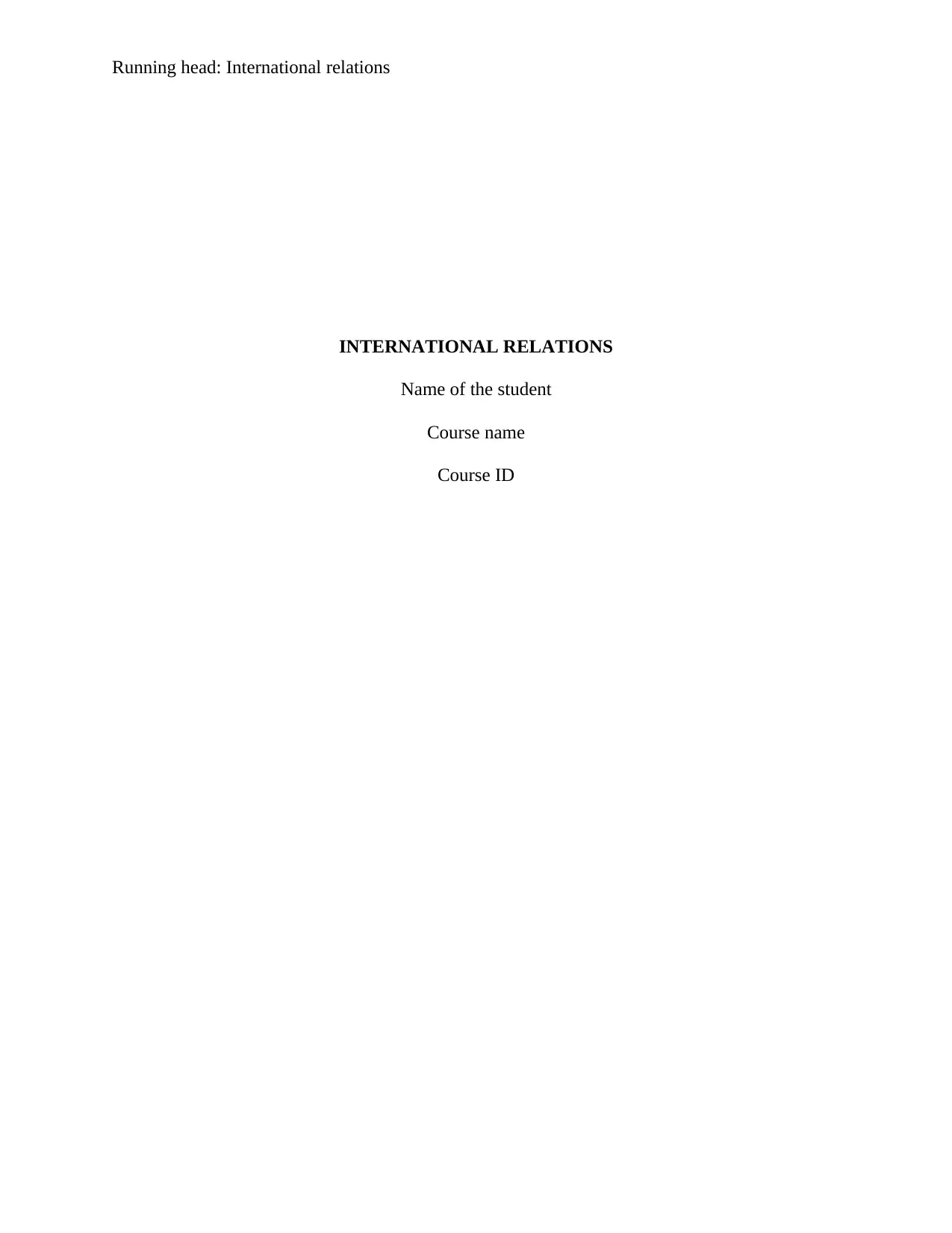
Running head: International relations
INTERNATIONAL RELATIONS
Name of the student
Course name
Course ID
INTERNATIONAL RELATIONS
Name of the student
Course name
Course ID
Secure Best Marks with AI Grader
Need help grading? Try our AI Grader for instant feedback on your assignments.
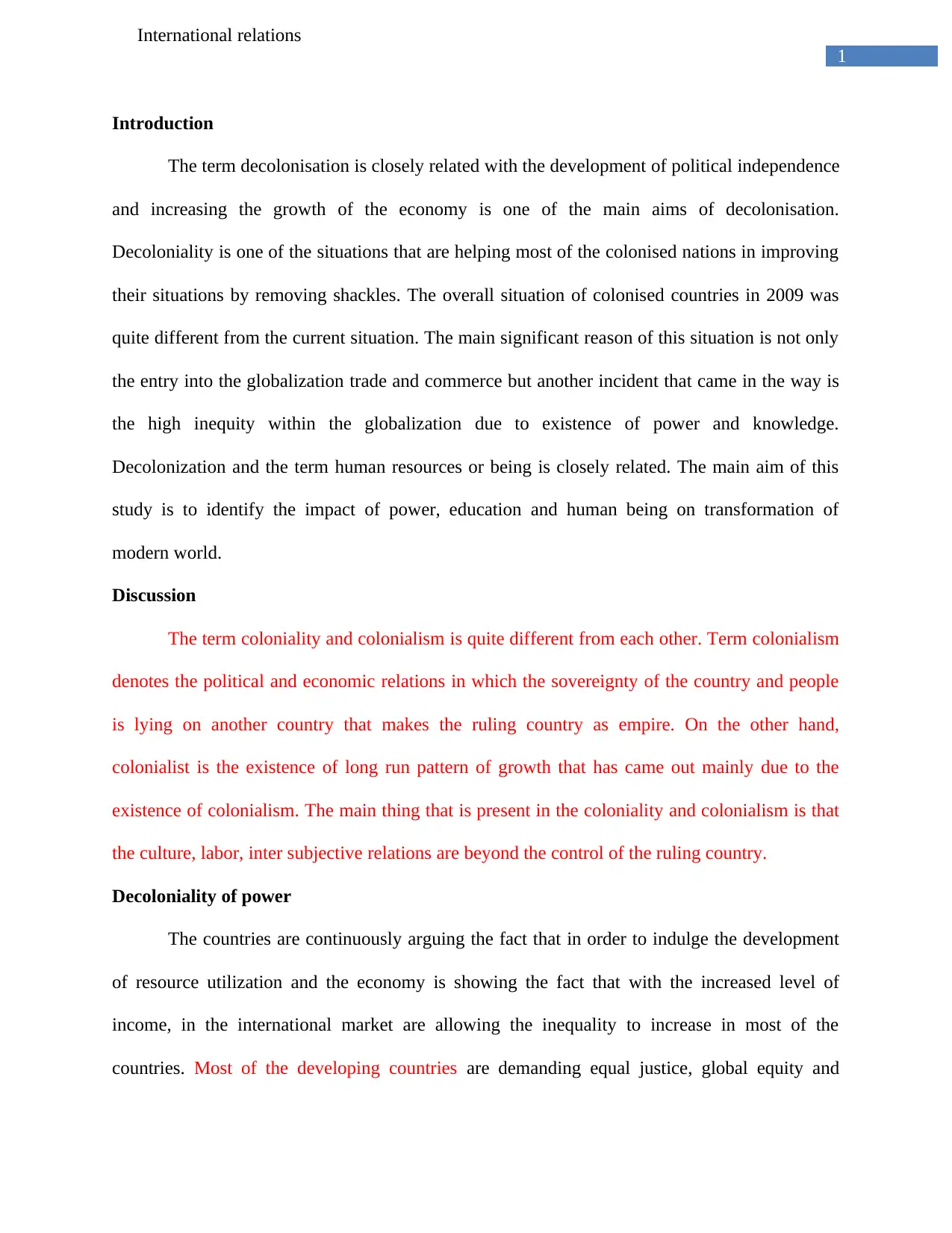
1
International relations
Introduction
The term decolonisation is closely related with the development of political independence
and increasing the growth of the economy is one of the main aims of decolonisation.
Decoloniality is one of the situations that are helping most of the colonised nations in improving
their situations by removing shackles. The overall situation of colonised countries in 2009 was
quite different from the current situation. The main significant reason of this situation is not only
the entry into the globalization trade and commerce but another incident that came in the way is
the high inequity within the globalization due to existence of power and knowledge.
Decolonization and the term human resources or being is closely related. The main aim of this
study is to identify the impact of power, education and human being on transformation of
modern world.
Discussion
The term coloniality and colonialism is quite different from each other. Term colonialism
denotes the political and economic relations in which the sovereignty of the country and people
is lying on another country that makes the ruling country as empire. On the other hand,
colonialist is the existence of long run pattern of growth that has came out mainly due to the
existence of colonialism. The main thing that is present in the coloniality and colonialism is that
the culture, labor, inter subjective relations are beyond the control of the ruling country.
Decoloniality of power
The countries are continuously arguing the fact that in order to indulge the development
of resource utilization and the economy is showing the fact that with the increased level of
income, in the international market are allowing the inequality to increase in most of the
countries. Most of the developing countries are demanding equal justice, global equity and
International relations
Introduction
The term decolonisation is closely related with the development of political independence
and increasing the growth of the economy is one of the main aims of decolonisation.
Decoloniality is one of the situations that are helping most of the colonised nations in improving
their situations by removing shackles. The overall situation of colonised countries in 2009 was
quite different from the current situation. The main significant reason of this situation is not only
the entry into the globalization trade and commerce but another incident that came in the way is
the high inequity within the globalization due to existence of power and knowledge.
Decolonization and the term human resources or being is closely related. The main aim of this
study is to identify the impact of power, education and human being on transformation of
modern world.
Discussion
The term coloniality and colonialism is quite different from each other. Term colonialism
denotes the political and economic relations in which the sovereignty of the country and people
is lying on another country that makes the ruling country as empire. On the other hand,
colonialist is the existence of long run pattern of growth that has came out mainly due to the
existence of colonialism. The main thing that is present in the coloniality and colonialism is that
the culture, labor, inter subjective relations are beyond the control of the ruling country.
Decoloniality of power
The countries are continuously arguing the fact that in order to indulge the development
of resource utilization and the economy is showing the fact that with the increased level of
income, in the international market are allowing the inequality to increase in most of the
countries. Most of the developing countries are demanding equal justice, global equity and
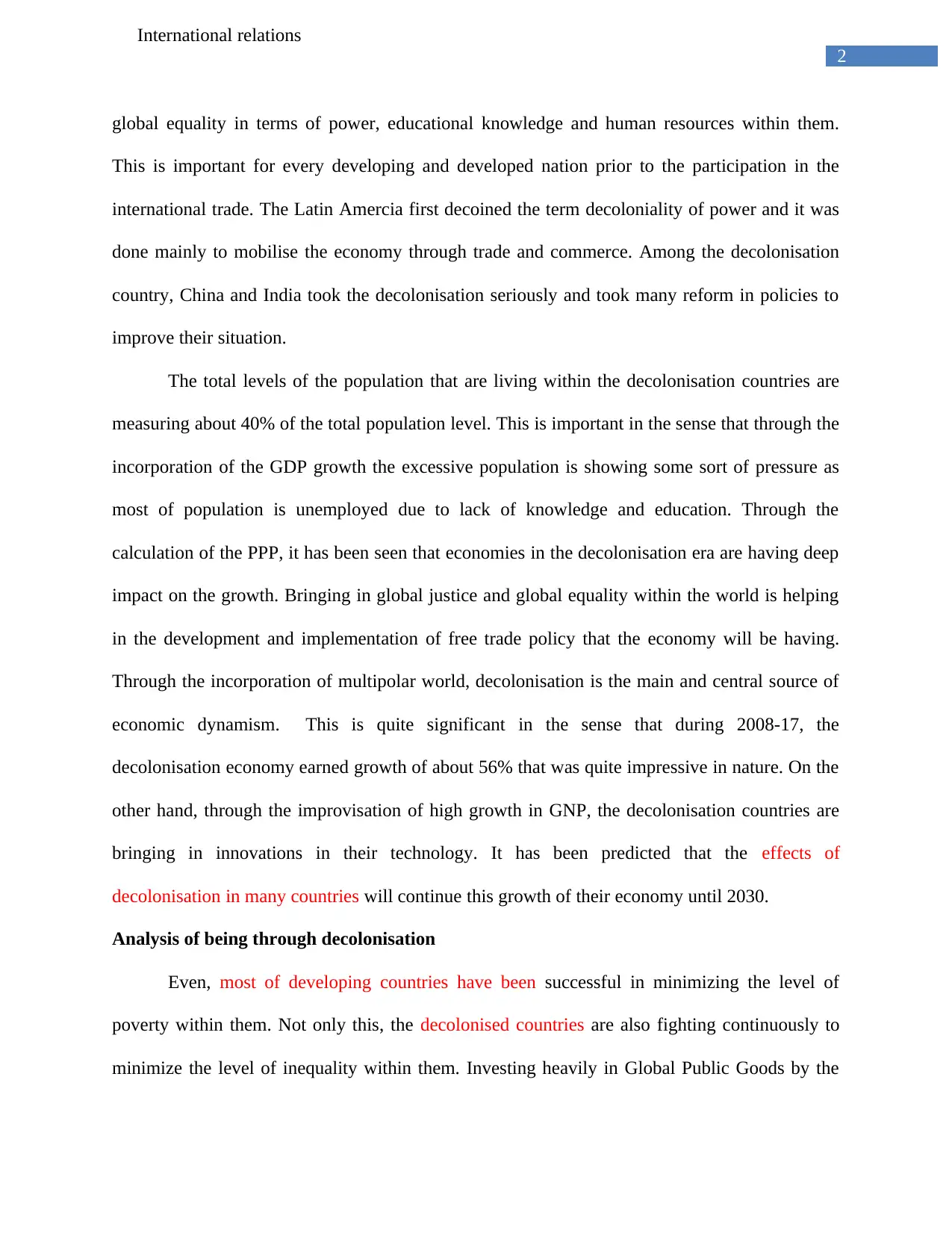
2
International relations
global equality in terms of power, educational knowledge and human resources within them.
This is important for every developing and developed nation prior to the participation in the
international trade. The Latin Amercia first decoined the term decoloniality of power and it was
done mainly to mobilise the economy through trade and commerce. Among the decolonisation
country, China and India took the decolonisation seriously and took many reform in policies to
improve their situation.
The total levels of the population that are living within the decolonisation countries are
measuring about 40% of the total population level. This is important in the sense that through the
incorporation of the GDP growth the excessive population is showing some sort of pressure as
most of population is unemployed due to lack of knowledge and education. Through the
calculation of the PPP, it has been seen that economies in the decolonisation era are having deep
impact on the growth. Bringing in global justice and global equality within the world is helping
in the development and implementation of free trade policy that the economy will be having.
Through the incorporation of multipolar world, decolonisation is the main and central source of
economic dynamism. This is quite significant in the sense that during 2008-17, the
decolonisation economy earned growth of about 56% that was quite impressive in nature. On the
other hand, through the improvisation of high growth in GNP, the decolonisation countries are
bringing in innovations in their technology. It has been predicted that the effects of
decolonisation in many countries will continue this growth of their economy until 2030.
Analysis of being through decolonisation
Even, most of developing countries have been successful in minimizing the level of
poverty within them. Not only this, the decolonised countries are also fighting continuously to
minimize the level of inequality within them. Investing heavily in Global Public Goods by the
International relations
global equality in terms of power, educational knowledge and human resources within them.
This is important for every developing and developed nation prior to the participation in the
international trade. The Latin Amercia first decoined the term decoloniality of power and it was
done mainly to mobilise the economy through trade and commerce. Among the decolonisation
country, China and India took the decolonisation seriously and took many reform in policies to
improve their situation.
The total levels of the population that are living within the decolonisation countries are
measuring about 40% of the total population level. This is important in the sense that through the
incorporation of the GDP growth the excessive population is showing some sort of pressure as
most of population is unemployed due to lack of knowledge and education. Through the
calculation of the PPP, it has been seen that economies in the decolonisation era are having deep
impact on the growth. Bringing in global justice and global equality within the world is helping
in the development and implementation of free trade policy that the economy will be having.
Through the incorporation of multipolar world, decolonisation is the main and central source of
economic dynamism. This is quite significant in the sense that during 2008-17, the
decolonisation economy earned growth of about 56% that was quite impressive in nature. On the
other hand, through the improvisation of high growth in GNP, the decolonisation countries are
bringing in innovations in their technology. It has been predicted that the effects of
decolonisation in many countries will continue this growth of their economy until 2030.
Analysis of being through decolonisation
Even, most of developing countries have been successful in minimizing the level of
poverty within them. Not only this, the decolonised countries are also fighting continuously to
minimize the level of inequality within them. Investing heavily in Global Public Goods by the
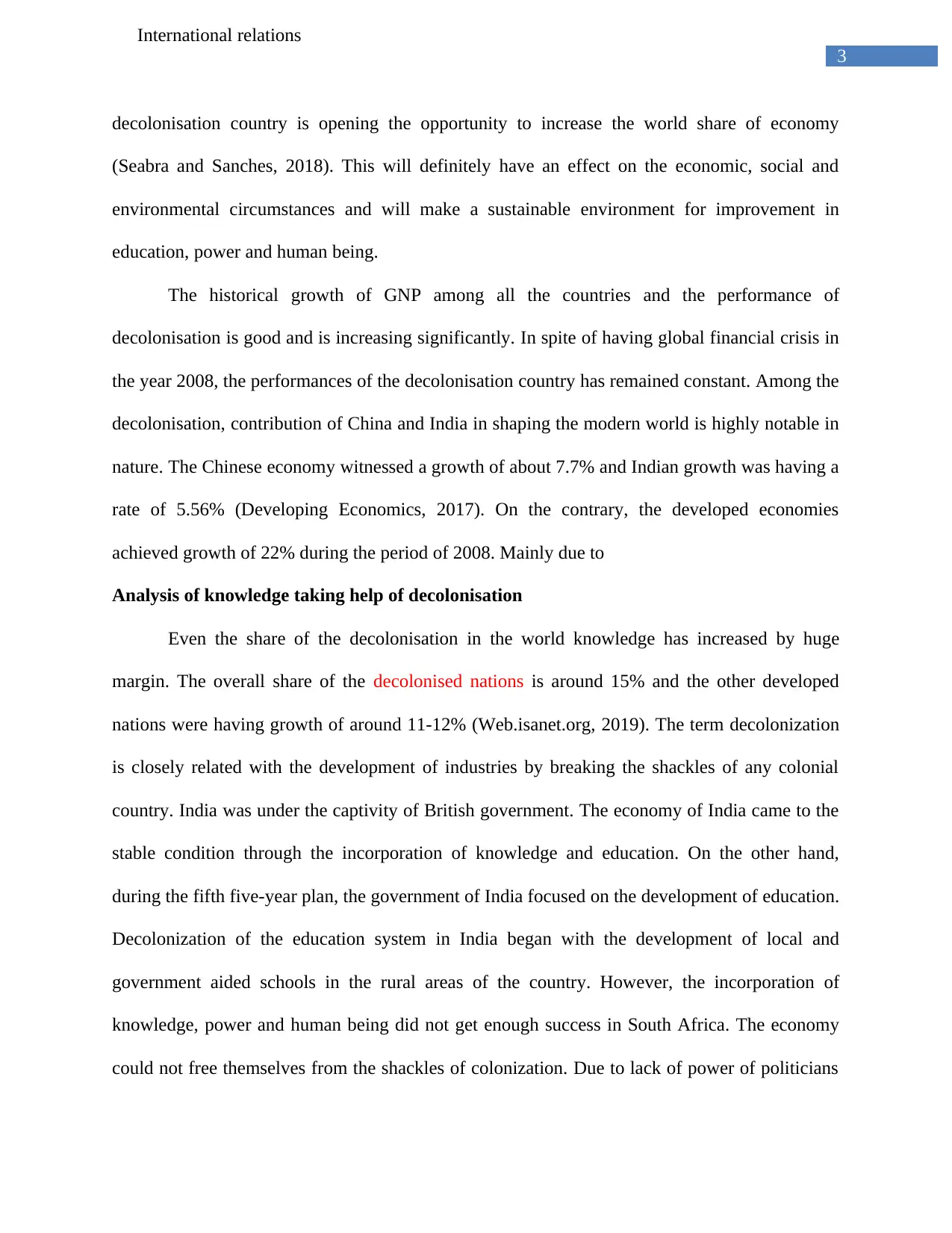
3
International relations
decolonisation country is opening the opportunity to increase the world share of economy
(Seabra and Sanches, 2018). This will definitely have an effect on the economic, social and
environmental circumstances and will make a sustainable environment for improvement in
education, power and human being.
The historical growth of GNP among all the countries and the performance of
decolonisation is good and is increasing significantly. In spite of having global financial crisis in
the year 2008, the performances of the decolonisation country has remained constant. Among the
decolonisation, contribution of China and India in shaping the modern world is highly notable in
nature. The Chinese economy witnessed a growth of about 7.7% and Indian growth was having a
rate of 5.56% (Developing Economics, 2017). On the contrary, the developed economies
achieved growth of 22% during the period of 2008. Mainly due to
Analysis of knowledge taking help of decolonisation
Even the share of the decolonisation in the world knowledge has increased by huge
margin. The overall share of the decolonised nations is around 15% and the other developed
nations were having growth of around 11-12% (Web.isanet.org, 2019). The term decolonization
is closely related with the development of industries by breaking the shackles of any colonial
country. India was under the captivity of British government. The economy of India came to the
stable condition through the incorporation of knowledge and education. On the other hand,
during the fifth five-year plan, the government of India focused on the development of education.
Decolonization of the education system in India began with the development of local and
government aided schools in the rural areas of the country. However, the incorporation of
knowledge, power and human being did not get enough success in South Africa. The economy
could not free themselves from the shackles of colonization. Due to lack of power of politicians
International relations
decolonisation country is opening the opportunity to increase the world share of economy
(Seabra and Sanches, 2018). This will definitely have an effect on the economic, social and
environmental circumstances and will make a sustainable environment for improvement in
education, power and human being.
The historical growth of GNP among all the countries and the performance of
decolonisation is good and is increasing significantly. In spite of having global financial crisis in
the year 2008, the performances of the decolonisation country has remained constant. Among the
decolonisation, contribution of China and India in shaping the modern world is highly notable in
nature. The Chinese economy witnessed a growth of about 7.7% and Indian growth was having a
rate of 5.56% (Developing Economics, 2017). On the contrary, the developed economies
achieved growth of 22% during the period of 2008. Mainly due to
Analysis of knowledge taking help of decolonisation
Even the share of the decolonisation in the world knowledge has increased by huge
margin. The overall share of the decolonised nations is around 15% and the other developed
nations were having growth of around 11-12% (Web.isanet.org, 2019). The term decolonization
is closely related with the development of industries by breaking the shackles of any colonial
country. India was under the captivity of British government. The economy of India came to the
stable condition through the incorporation of knowledge and education. On the other hand,
during the fifth five-year plan, the government of India focused on the development of education.
Decolonization of the education system in India began with the development of local and
government aided schools in the rural areas of the country. However, the incorporation of
knowledge, power and human being did not get enough success in South Africa. The economy
could not free themselves from the shackles of colonization. Due to lack of power of politicians
Secure Best Marks with AI Grader
Need help grading? Try our AI Grader for instant feedback on your assignments.
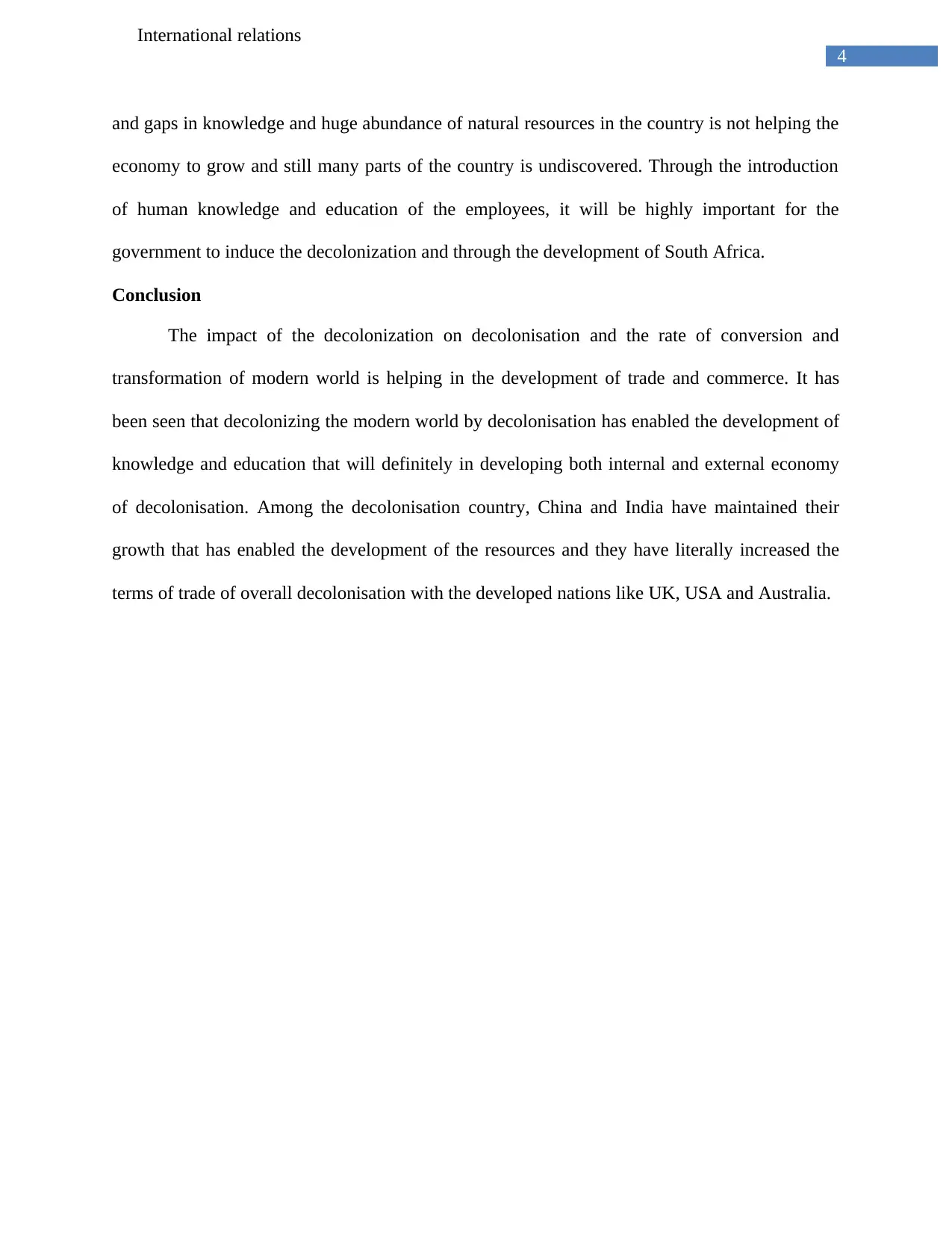
4
International relations
and gaps in knowledge and huge abundance of natural resources in the country is not helping the
economy to grow and still many parts of the country is undiscovered. Through the introduction
of human knowledge and education of the employees, it will be highly important for the
government to induce the decolonization and through the development of South Africa.
Conclusion
The impact of the decolonization on decolonisation and the rate of conversion and
transformation of modern world is helping in the development of trade and commerce. It has
been seen that decolonizing the modern world by decolonisation has enabled the development of
knowledge and education that will definitely in developing both internal and external economy
of decolonisation. Among the decolonisation country, China and India have maintained their
growth that has enabled the development of the resources and they have literally increased the
terms of trade of overall decolonisation with the developed nations like UK, USA and Australia.
International relations
and gaps in knowledge and huge abundance of natural resources in the country is not helping the
economy to grow and still many parts of the country is undiscovered. Through the introduction
of human knowledge and education of the employees, it will be highly important for the
government to induce the decolonization and through the development of South Africa.
Conclusion
The impact of the decolonization on decolonisation and the rate of conversion and
transformation of modern world is helping in the development of trade and commerce. It has
been seen that decolonizing the modern world by decolonisation has enabled the development of
knowledge and education that will definitely in developing both internal and external economy
of decolonisation. Among the decolonisation country, China and India have maintained their
growth that has enabled the development of the resources and they have literally increased the
terms of trade of overall decolonisation with the developed nations like UK, USA and Australia.
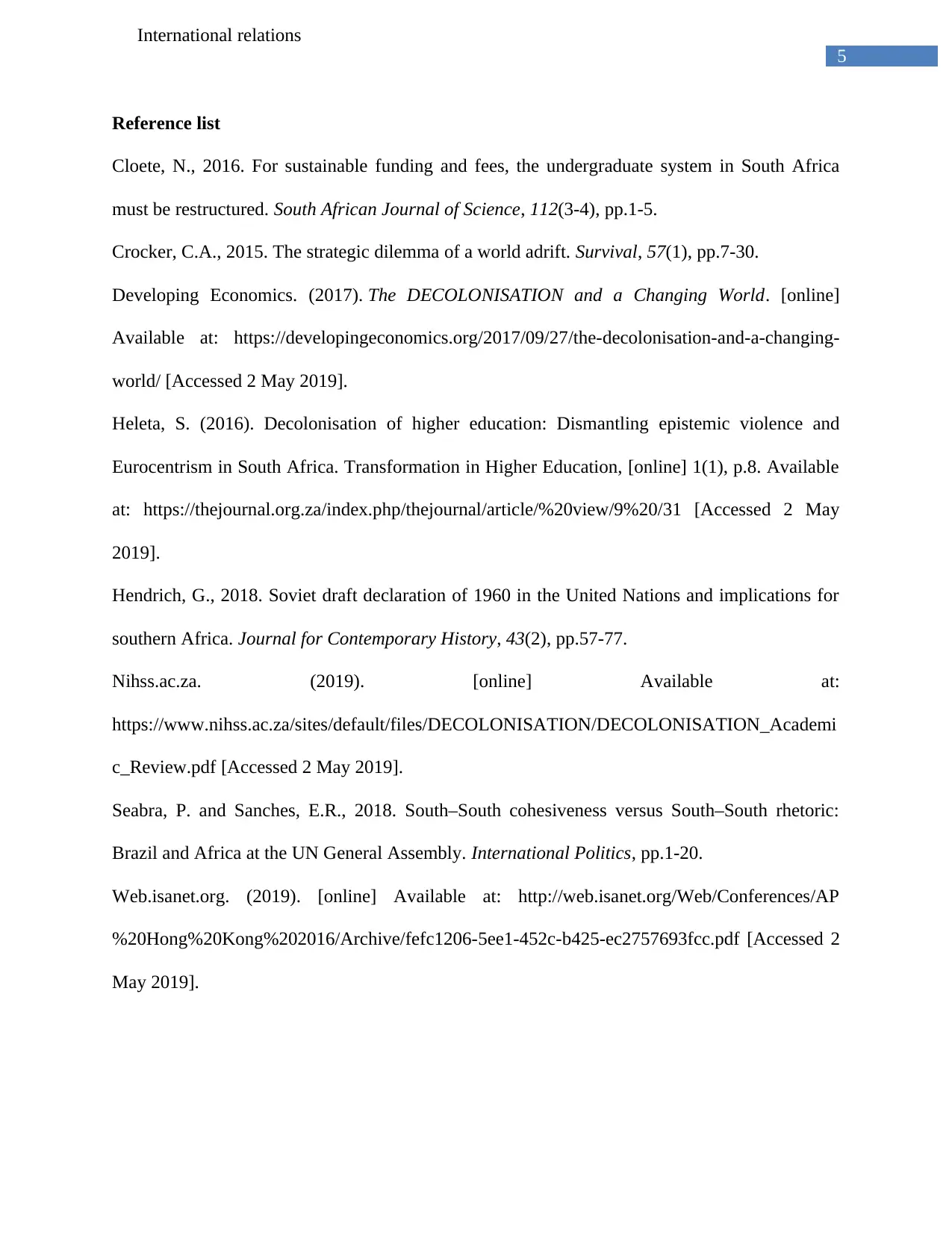
5
International relations
Reference list
Cloete, N., 2016. For sustainable funding and fees, the undergraduate system in South Africa
must be restructured. South African Journal of Science, 112(3-4), pp.1-5.
Crocker, C.A., 2015. The strategic dilemma of a world adrift. Survival, 57(1), pp.7-30.
Developing Economics. (2017). The DECOLONISATION and a Changing World. [online]
Available at: https://developingeconomics.org/2017/09/27/the-decolonisation-and-a-changing-
world/ [Accessed 2 May 2019].
Heleta, S. (2016). Decolonisation of higher education: Dismantling epistemic violence and
Eurocentrism in South Africa. Transformation in Higher Education, [online] 1(1), p.8. Available
at: https://thejournal.org.za/index.php/thejournal/article/%20view/9%20/31 [Accessed 2 May
2019].
Hendrich, G., 2018. Soviet draft declaration of 1960 in the United Nations and implications for
southern Africa. Journal for Contemporary History, 43(2), pp.57-77.
Nihss.ac.za. (2019). [online] Available at:
https://www.nihss.ac.za/sites/default/files/DECOLONISATION/DECOLONISATION_Academi
c_Review.pdf [Accessed 2 May 2019].
Seabra, P. and Sanches, E.R., 2018. South–South cohesiveness versus South–South rhetoric:
Brazil and Africa at the UN General Assembly. International Politics, pp.1-20.
Web.isanet.org. (2019). [online] Available at: http://web.isanet.org/Web/Conferences/AP
%20Hong%20Kong%202016/Archive/fefc1206-5ee1-452c-b425-ec2757693fcc.pdf [Accessed 2
May 2019].
International relations
Reference list
Cloete, N., 2016. For sustainable funding and fees, the undergraduate system in South Africa
must be restructured. South African Journal of Science, 112(3-4), pp.1-5.
Crocker, C.A., 2015. The strategic dilemma of a world adrift. Survival, 57(1), pp.7-30.
Developing Economics. (2017). The DECOLONISATION and a Changing World. [online]
Available at: https://developingeconomics.org/2017/09/27/the-decolonisation-and-a-changing-
world/ [Accessed 2 May 2019].
Heleta, S. (2016). Decolonisation of higher education: Dismantling epistemic violence and
Eurocentrism in South Africa. Transformation in Higher Education, [online] 1(1), p.8. Available
at: https://thejournal.org.za/index.php/thejournal/article/%20view/9%20/31 [Accessed 2 May
2019].
Hendrich, G., 2018. Soviet draft declaration of 1960 in the United Nations and implications for
southern Africa. Journal for Contemporary History, 43(2), pp.57-77.
Nihss.ac.za. (2019). [online] Available at:
https://www.nihss.ac.za/sites/default/files/DECOLONISATION/DECOLONISATION_Academi
c_Review.pdf [Accessed 2 May 2019].
Seabra, P. and Sanches, E.R., 2018. South–South cohesiveness versus South–South rhetoric:
Brazil and Africa at the UN General Assembly. International Politics, pp.1-20.
Web.isanet.org. (2019). [online] Available at: http://web.isanet.org/Web/Conferences/AP
%20Hong%20Kong%202016/Archive/fefc1206-5ee1-452c-b425-ec2757693fcc.pdf [Accessed 2
May 2019].

6
International relations
International relations
1 out of 7
Related Documents
Your All-in-One AI-Powered Toolkit for Academic Success.
+13062052269
info@desklib.com
Available 24*7 on WhatsApp / Email
![[object Object]](/_next/static/media/star-bottom.7253800d.svg)
Unlock your academic potential
© 2024 | Zucol Services PVT LTD | All rights reserved.





